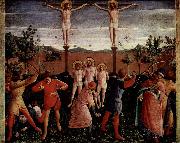|

|
|
Click to Enlarge
|
| Fra_Angelico
|
Hauptaltar der Heiligen Kosmas und Damian aus dem Dominikanerklosters San Marco in Florenz, Predella
new23/Fra Angelico-535638.jpg |
|
|
|
|
| Hauptaltar der Heiligen Kosmas und Damian aus dem Dominikanerklosters San Marco in Florenz, Predella, sechste Szene: Martyrium der Heiligen Kosmas und Damian, Erettung von Kreuzigung und Steinigung
cjr |
|
Fra Angelico Galleries
b.c. 1400, Vicchio, Florence
d.Feb. 18, 1455, Rome
Fra Angelico (c. 1395 ?C February 18, 1455), born Guido di Pietro, was an Early Italian Renaissance painter, referred to in Vasari's Lives of the Artists as having "a rare and perfect talent".
Known in Italy as il Beato Angelico, he was known to his contemporaries as Fra Giovanni da Fiesole (Brother John from Fiesole). In Giorgio Vasari's Lives of the Artists, written prior to 1555, he was already known as Fra Giovanni Angelico (Brother Giovanni the Angelic One).
Within his lifetime or shortly thereafter he was also called Il Beato (the Blessed), in reference to his skills in painting religious subjects. In 1982 Pope John Paul II conferred beatification, thereby making this title official. Fiesole is sometimes misinterpreted as being part of his formal name, but it was merely the name of the town where he took his vows, used by contemporaries to separate him from other Fra Giovannis. He is listed in the Roman Martyrology as Beatus Ioannes Faesulanus, cognomento Angelicus??"Blessed Giovanni of Fiesole, nicknamed Angelico".
Fra Angelico was working at a time when the style of painting was in a state of change. This process of change had begun a hundred years previous with the works of Giotto and several of his contemporaries, notably Giusto de' Menabuoi, both of whom had created their major works in Padua, although Giotto was trained in Florence by the great Gothic artist, Cimabue, and painted a fresco cycle of St Francis in the Bardi Chapel in Santa Croce. Giotto had many enthusiastic followers, who imitated his style in fresco, some of them, notably the Lorenzetti, achieving great success.
|
|
|
Prev Art Next Art |
|

